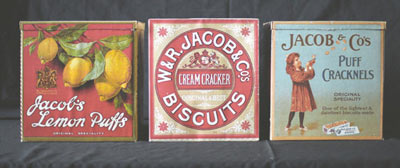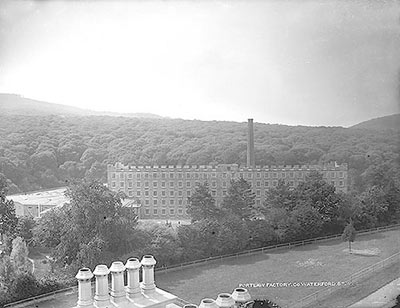Many Irish Quaker families have been involved in business in Ireland in the 350 years since the Religious Society of Friends came here.

Bewley’s
Bewley’s was founded in 1840, initially as tea and coffee merchants. 1926 saw the incorporation of the familiar Bewley’s Oriental Cafés, where generations of Dubliners have enjoyed sticky buns, superb coffee, and much else. Victor Bewley, mentioned in the panel “Quakers in Action”, became chairman in the early 1930s. In 1972 he and his co-directors decided the company should no longer remain in private hands, and transferred it into a trust company owned by all employees. In 1986 it was acquired by the present owners.
W & R Jacob
W & R Jacob started as a small bakery in Waterford, but began making biscuits in quantity in Dublin in 1852. “Cream Crackers” were introduced in 1885, and “Jacob’s Biscuits” became one of the best known brand names in Ireland. By the early 1900s employment was above 1,300 and an unusually advanced welfare service was introduced for the staff. A second factory was opened in Liverpool in 1912. In 1948 the Jacob and Bewley families who by then were running the business floated it as a public company. It is now owned by a company named “Jacob Fruitfield” who still jealously guard the secret of how to put the figs in fig rolls! This company is now also a distributor of Bewley’s products.

Thomas Pim
Thomas Pim was chairman of the first Irish railway company that built the line from Dublin to Kingstown (now Dun Laoghaire). His brother James was also involved, as were a number of other Quaker families.
Goodbody
Among the Goodbody enterprises were flour milling, jute spinning and weaving, plastics, and the manufacture of tobacco products.

The Malcomsons
Perhaps the Malcomsonswere the most remarkable. Their rise and fall between 1825 and 1877 is fascinating. David Malcomson was born in Ulster, but started his career as a miller in Clonmel, Co. Tipperary. He then decided there was a future for cotton spinning and weaving, and in 1825 built a cotton mill in Portlaw, Co. Waterford, which used water power from the Clodiagh, a tributary of the Suir. By the time he died in 1844 there were 1,800 workers, and the village of Portlaw that Malcomsons built for employees had a population of 4,351 by 1851. They founded the Neptune Iron Works, a shipyard, in Waterford in 1843, and by 1858 owned 70 ships. Sadly, the family members with business acumen died out, and by 1877 the businesses went bankrupt. Other Irish Quaker shipbuilders were White and Penrose in Waterford, Beale and Lecky in Cork and Bewley , Walpole and Webb in Dublin.
The Richardsons
In Ulster the Richardsons built a large damask linen mill in Bessbrook, near Newry, in the 1840s. They built a “model” village which was said to have “no pub, no pawnshop, no police”. This village, as well as the famous town of Bournville built by the Quaker family of Cadburys near Birmingham, and one built by the Rowntrees (also Quakers) near York owed their concept partly to Portlaw.
